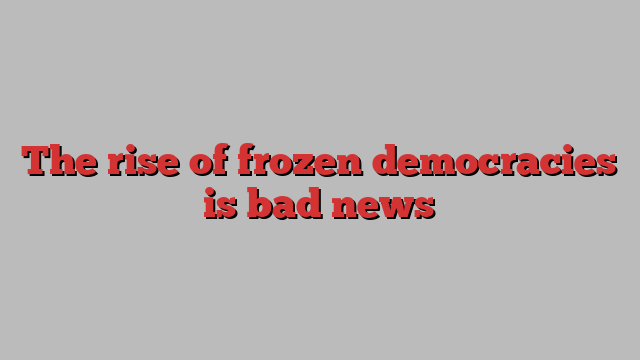
Unlock the Editor’s Digest for free
Roula Khalaf, Editor of the FT, selects her favourite stories in this weekly newsletter.
The writer is an FT contributing editor, chair of the Centre for Liberal Strategies, Sofia, and fellow at IWM Vienna
Do you know the name of the Bulgarian prime minister? I am fairly sure you do not. But don’t feel uncomfortable about it — most Bulgarians don’t know the name of their premier either. And how could they? In just three years, Bulgaria has gone through six parliamentary elections. Four times, the newly elected parliament failed to form a government. In the two instances when a government was formed, it survived for less than a year and displayed all the failings of an arranged marriage. On October 27, Bulgarians will vote again. There is a 50/50 chance they’ll elect a government.
So far the effects of this Bulgarian version of long political Covid include: modest economic growth; low voter turnout that continues to fall (in October it is predicted to be around 30 per cent); excessive political cynicism; the proliferation of new protest parties; paralysed bureaucracy; and Bulgaria’s marginalisation on the European political stage.
But while the situation looks depressing, one of the reasons you probably haven’t heard of the Bulgarian PM is that, for the moment at least, the country is keeping the hard right out of government — unlike Hungary or Slovakia. So, is Bulgaria a success or a failure?
Rather than a populist hellscape, Bulgaria is a frozen democracy. The suspicion is that political parties cannot govern because they do not want to govern. For their voters, it is more important to be clear about who they won’t co-operate with than about what could be achieved. The unresolved question of Bulgarian politics is: who really governs the country?
Bulgaria’s case could be dismissed as a kind of political exotica were it not for the fact that it is infectious. What might be called impasse democracies, run by short-lived governments or technocratic administrations with enough votes to survive for a while but insufficient support actually to govern, are the new trend in Europe. The new French government led by Michel Barnier, for instance, is one. The government that emerges from the German federal elections next year could be another. In both these, cases, the fear of repressive rightwing governments threatens to bring to power depressive centrist ones.
A decade ago, the political scientist Moisés Naím observed that “power no longer buys as much as it did . . . [P]ower is easier to get, harder to use — and easier to lose.” Naím’s fear was that democratic governments are sliding into impotence.
Recently he revised his thesis in the wake of the rise of authoritarian leaders and authoritarian-style politics in otherwise democratic regimes. But paralysed democracies have not disappeared. While most political commentators are focused on the success of the hard right, it could turn out that polarised fragmentation rather than American-style polarisation is the most pressing threat to European democracies.
The Bulgarian story is not that of a country deeply divided over values or policies. Rather, it is one of a society riven by cynicism and mistrust. The dividing lines between political parties are too numerous and the fear of compromise too great, so politicians calculate that voters reward them for what they do not do rather than for what they do.
While the rise of the populist right often results in higher electoral turnout and renewed interest in politics, polarised fragmentation of the kind we see in Bulgaria leads to public disenchantment with politics. In polarised democracies such as Poland, Turkey or the US, the electoral success of the populist right has triggered strong civic and democratic mobilisation. In Bulgaria, by contrast, the result of the politics of polarised fragmentation is widespread resignation.
Authoritarian majoritarianism, contested elections and the capture of public institutions by the ruling party are the principal outcomes of extreme polarisation. Every change of government in a polarised democracy is a form of regime change. But the main result of the deadly cocktail of polarisation and fragmentation tends to be profound disillusionment with democracy.
Judged from the outside, the “Bulgarian disease” could be seen as the lesser evil compared with the presence of the hard right in government. It creates the illusion that the centre still holds. But that judgment will probably have to be revised. Civil society intuitively knows what to do when a party like Poland’s Law and Justice comes to power. It is much less obvious what civil society should do when nobody knows the name of the prime minister (Dimitar Glavchev by the way) and has no reason to learn it.
When asked to define pornography, an American judge once famously said, “I know it when I see it.” Europe’s problem today is the opposite. Although it is easy to define authoritarianism, it might be challenging to identify the slow drift away from democracy, especially when it’s happening in your own backyard.